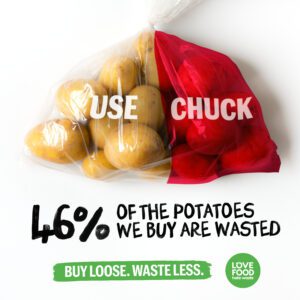Food Waste Action Week 2024
- News
- -
From 17th – 23rd March 2025, we're all encouraged to love food and hate waste during the fourth annual Food Waste Action Week
This is an entire week of action dedicated to raising awareness of the environmental costs of the food that we waste. It also promotes activities that help to reduce the size of the problem. The long-term goal is to halve the amount of food that’s binned by 2030.
The figures speak for themselves. Around a third of the food produced globally is wasted and its impact on the environment is significant. In the UK alone, we produce around 18 million tonnes of CO2 from wasted food and drink. At a time when the cost of living is a concern for most, it’s alarming to learn we could be saving 8 meals a week if we didn’t bin food unnecessarily.
Key Points
- A week of action to raise awareness of the food waste crisis
- Aims to halve the amount of food that's binned by 2030
- 2025's focus is on the impact of buying loose fruit and vegetables
- Spotlight on Local Authorities
- Challenges remain in the industry
Four Years of Food Waste Action Week
2021
The first year focused on Climate Change and the problems wasting food can cause.
2022
Looked at the impact our actions had and focussed on spreading the message that wasting food isn’t acceptable.
2023
2024
‘Choose What You’ll Use’ – putting a spotlight on how buying loose fruit and vegetables can help us buy within our means and further reduce food waste created by over-buying.
Food Waste Action Week 2025’s focus is Buy Loose. Waste Less. Putting an emphasis on how buying loose fruits and vegetables in quantities you need, instead of overbuying as a result of multi-packs and wasting food.
This year, they are really focussing on the education of the impact food waste has on us all, specifically targeting the narrative aimed at schools from brands, retailers and policy makers.
If all apples, bananas and potatoes were sold loose, 60,000 tonnes of food waste could be saved every year.
- WRAP

Image: WRAP
Weekly food waste collections
The problem of food waste is now in the spotlight more than ever before. The challenges posed by climate change mean that a whole raft of harmful habits and behaviours will need to be changed if the country is to meet its Net Zero target.
The Environment Act 2021 placed a new responsibility on local authorities to begin weekly household food waste collections. Currently, around 50% of local authorities already provide food waste collection, but some of these only offer the service fortnightly, often alongside their green waste collection.
From 2026, all local authorities will need a waste and resources action plan and be required to provide a collection on a weekly basis. This is likely to present a logistical challenge
While this is likely to prove challenging for many authorities, however, by reducing household food waste and providing a collection of the waste that is produced, the government hopes to drive down the carbon footprint of UK food waste. We’d strongly encourage Local Authorities to reach out to us and other AD plants around the country to discuss how we can tackle this challenge together.

Image: WRAP
Industry challenges
In addition to household food waste, businesses are also responsible for significant quantities of food waste. From leisure and hospitality to supermarkets and food manufacturing businesses, unwanted ingredients, processed foods, and other resources are frequently thrown away.
Reducing the amount of food wasted across the board is a key challenge for the UK over the coming years, but doing so can be challenging for individual businesses.
Let’s not ignore that there are problems of storage, transportation, and disposal to consider. Financial and environmental costs have to be considered, as well as any regulatory requirements that businesses are required to meet. Wasting food feeds climate change so government pressure on industry to lower the amount of food that is lost or wasted is likely to increase. Industry requirements for a cohesive resources action programme will be paramount.
BioteCH4 can provide the solution
BioteCH4 is one of the leading anaerobic digestion operators in the country. We handle the safe and environmentally appropriate collection and transportation of food waste, oils, and fats for recycling. Working with local authorities and commercial organisations, we provide a range of solutions to help reduce the amount of food waste that ends up in landfills. We also understand that few businesses have the time, inclination, or resources to devote to managing their food waste.
We act as the link between food producers and the end-user, offering a pallet collection service for food waste that might otherwise be financially prohibitive to deal with. We make it easier for businesses to recycle their food waste, whilst also helping them to lower their carbon footprint overall.
Our Services
We can collect and process food waste, oils and fats, and category 3 animal by-products as well as local authority and commercial waste.
We’re always happy to provide advice and answer any questions you might have about food waste and our food waste management services. For more information, discover more below or drop the team an email at enquiries@ch4mail.com.



